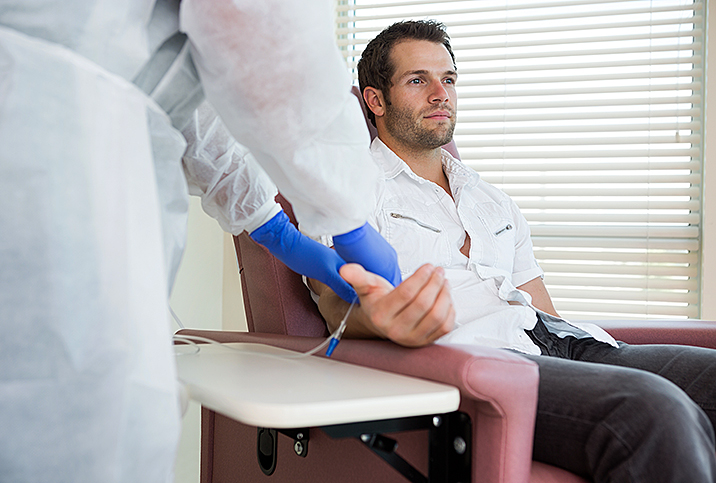Radiation for Prostate Cancer: Side Effects & How to Cope

Radiation for prostate cancer can pose a number of obstacles to your health, from sexual enjoyment to fathering a child. Despite the potential frightening side effects, radiation is an effective treatment method for many candidates, and the majority of side effects are manageable.
Defining prostate cancer
Prostate cancer occurs when cells of the prostate—the small, walnut-shaped gland below the bladder that produces seminal fluid—grow out of control. The disease affects 13 percent of American men. Additionally, men over age 50, men with a family history of the disease and Black men are more likely to be diagnosed with prostate cancer.
Prostate cancer may be suspected following a digital rectal exam (DRE) and/or a prostate-specific antigen (PSA) blood test, while a core needle biopsy confirms diagnosis.
Prostate cancer is one of the most curable forms of cancer, with more than 90 percent of patients living at least five years after treatment. Treatment options vary depending on the stage of the cancer. Active surveillance is commonly recommended for early stages, as are surgery (radical prostatectomy), radiation and hormone therapies. For more advanced cancer, lymph node removal may be required, and treatments often include radiation, chemotherapy or immunotherapy.
Radiation for prostate cancer
Radiation uses high-energy rays or particles to kill cancer cells. There are two forms commonly used to treat prostate cancer:
- External beam: Rays are directed at the tumor from outside the body.
- Brachytherapy: Radioactive material is placed inside or alongside the tumor.
Radiation therapy benefits include shrinking tumors, halting cancer progression and relieving symptoms. Radiation treats cancer without the side effects of a hormone treatment or the invasiveness of surgery. Outcomes are generally favorable. For example, external beam radiation therapy has an overall five-year survival rate of 98.8 percent.
Common side effects
Short-term side effects of radiation treatment include:
- Rectal changes, such as loose stool or more frequent bowel movements
- Skin irritation similar to a sunburn
- General fatigue
- Hair loss in the pelvic area
- Urinary issues, such as increased frequency and urgency or general incontinence
Less common side effects
Long-term effects of prostate radiation include rectal or bladder inflammation, urinary or rectal bleeding, chronic diarrhea, narrowing of the urethra and rectal ulcer. These side effects are less common—only 1 in 20 men experience them.
Radiation leads to two particularly challenging long-term problems: erectile dysfunction (ED) and decreased fertility. ED is caused by radiation ray damage to blood vessels and nerves. Seventy percent of men with normal erectile function prior to radiation will maintain it, but men who experienced trouble beforehand are at greater risk after treatment. Newer, vessel-sparing radiation techniques are more effective, with 80 percent of recipients maintaining functionality. Fertility issues are more common after treatment because the prostate and seminal vesicles create the fluid that nourishes and carries sperm; dry orgasm, or climaxing without ejaculation, is also possible and contributes to sexual problems.
Coping with side effects
You can find solutions for most of the side effects of radiation treatment for prostate cancer. Medications can help with urinary symptoms, as can pelvic floor exercises. A low-fiber diet and antidiarrheals can help alleviate loose stools. For skin irritation, soothe sensitive skin by gently cleansing with warm water and a mild soap and pat dry. Avoid lotions and creams, and keep clothes loose-fitting around the hips. Generally, improving sleep habits, incorporating doctor-approved exercise and eating a balanced diet with a focus on whole foods should increase overall energy.
You can manage ED with medication, medical devices, implants or vascular surgeries to keep your sex life after prostate cancer robust. A sex therapist can provide useful tips and advice, or treatment plans. While conception via intercourse may no longer be possible, the majority of men still have healthy sperm and may be able to father children through sperm banking or by extracting sperm directly from the testes, followed by intrauterine insemination (IUI) or in vitro fertilization (IVF). Talk to your doctor about fertility goals before treatment and be open with your partner to work together to meet your goals as a couple.
Success is possible
A prostate cancer diagnosis can be alarming, but radiation treatment can help resolve the disease with minimal effects on your quality of life. Following these guidelines should help you feel your best in your battle against prostate cancer.


















